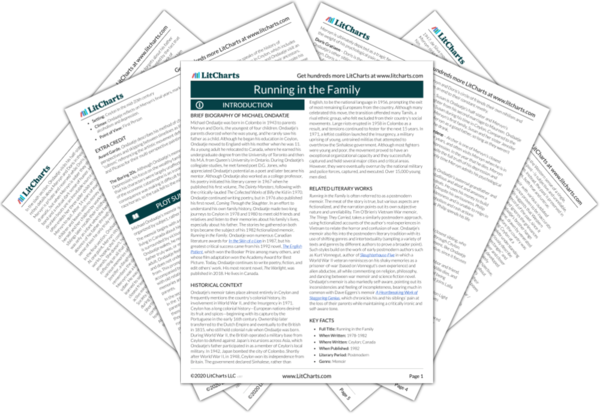Doris Gratiaen Quotes in Running in the Family
[Mervyn] bought Doris a huge emerald engagement ring which he charged to his father’s account. His father refused to pay and my father threatened to shoot himself. Eventually, it was paid for by the family.

Unlock explanations and citation info for this and every other Running in the Family quote.
Plus so much more...
Get LitCharts A+The waste of youth. Burned purposeless. They forgave that and understood that before everything else. After Francis died there was really nowhere to go.
Love affairs rainbowed over marriages and lasted forever—so it often seemed that marriage was the greater infidelity. From the twenties until the war nobody really had to grow up. The remained wild and spoiled.
Eccentrics can be the most irritating people to live with. My mother, for instance, strangely never spoke of Lalla to me. Lalla was loved by people who saw her arriving from the distance like a storm.
[Mervyn and Doris] were both from gracious, genteel families, but my father went down a path unknown to his parents and wife. She followed him and coped with him for fourteen years, surrounding his behavior like a tough and demure breeze.
Everything is there, of course. Their good looks behind the tortured faces, their mutual humor, and the fact that both them are hams of a very superior sort. The evidence I wanted that they were absolutely perfect for each other. My father’s tanned skin, my mother’s milk paleness, and this theatre of their own making.
It is the only photograph I have found of them together.
“[Doris] belonged to a type of Ceylonese family whose women would take the minutest reaction from another and blow it up into a tremendously exciting tale, then later use it as an example of someone’s strain of character. If anything kept their generation alive, it was this recording by exaggeration.
[Mervyn and Doris] had come a long way in fourteen years from being the products of two of the best known and wealthiest families in Ceylon: my father now owning only a chicken farm at Rock Hill, my mother working in a hotel.

Doris Gratiaen Quotes in Running in the Family
[Mervyn] bought Doris a huge emerald engagement ring which he charged to his father’s account. His father refused to pay and my father threatened to shoot himself. Eventually, it was paid for by the family.

Unlock explanations and citation info for this and every other Running in the Family quote.
Plus so much more...
Get LitCharts A+The waste of youth. Burned purposeless. They forgave that and understood that before everything else. After Francis died there was really nowhere to go.
Love affairs rainbowed over marriages and lasted forever—so it often seemed that marriage was the greater infidelity. From the twenties until the war nobody really had to grow up. The remained wild and spoiled.
Eccentrics can be the most irritating people to live with. My mother, for instance, strangely never spoke of Lalla to me. Lalla was loved by people who saw her arriving from the distance like a storm.
[Mervyn and Doris] were both from gracious, genteel families, but my father went down a path unknown to his parents and wife. She followed him and coped with him for fourteen years, surrounding his behavior like a tough and demure breeze.
Everything is there, of course. Their good looks behind the tortured faces, their mutual humor, and the fact that both them are hams of a very superior sort. The evidence I wanted that they were absolutely perfect for each other. My father’s tanned skin, my mother’s milk paleness, and this theatre of their own making.
It is the only photograph I have found of them together.
“[Doris] belonged to a type of Ceylonese family whose women would take the minutest reaction from another and blow it up into a tremendously exciting tale, then later use it as an example of someone’s strain of character. If anything kept their generation alive, it was this recording by exaggeration.
[Mervyn and Doris] had come a long way in fourteen years from being the products of two of the best known and wealthiest families in Ceylon: my father now owning only a chicken farm at Rock Hill, my mother working in a hotel.











